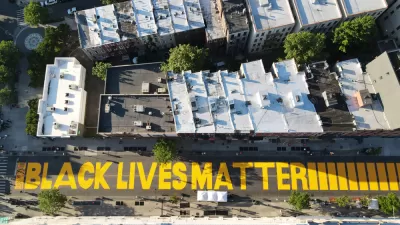An architecture critic disavows ‘gatekeeping’ in the field.

In an op-ed published in The Nation, architecture critic Kate Wagner issues a call to her peers to remember that “architecture is for everyone,” not just lofty-minded designers and critics. Moreover, all architecture is interesting in its own way.
I believe that all buildings are interesting simply because they make up the backdrop of everyday life, and in each building, from the most sacred to the most mundane, one can read and interpret the history of a given place and the values of its society, from potent religiosity to drab consumerism.
For Wagner, the “credentialism and gatekeeping” engaged in by many architecture critics and historians is “silly, and also self-defeating.” As Wagner puts it, “Many folks are bird watchers without degrees in biology.”
Wagner illustrates the difference between high-minded design and everyday reality. “An architect, who painstakingly finishes their facade with the idea that all will be unified and made whole from a long distance, is likely to be disappointed with someone growing geraniums in a railing flower box. But it is not a design failure if the building is used in this way—indeed, it is a success.” Because architecture is meant to be used, lived in, and adapted to the changing needs of those inhabiting it.
Architecture can be imposing, awe-inspiring, and innovative. But Wagner’s piece highlights the importance of remembering that it is also—almost always—ordinary, and necessarily so. “Every time you protest rising rents or living conditions, or even just inhabit the commons as a citizen, that’s participating in architecture. Every time you move, rent an apartment, renovate, or decorate, that’s participating in architecture.”
FULL STORY: Stop Gatekeeping Architecture

Planetizen Federal Action Tracker
A weekly monitor of how Trump’s orders and actions are impacting planners and planning in America.

Maui's Vacation Rental Debate Turns Ugly
Verbal attacks, misinformation campaigns and fistfights plague a high-stakes debate to convert thousands of vacation rentals into long-term housing.

San Francisco Suspends Traffic Calming Amidst Record Deaths
Citing “a challenging fiscal landscape,” the city will cease the program on the heels of 42 traffic deaths, including 24 pedestrians.

Defunct Pittsburgh Power Plant to Become Residential Tower
A decommissioned steam heat plant will be redeveloped into almost 100 affordable housing units.

Trump Prompts Restructuring of Transportation Research Board in “Unprecedented Overreach”
The TRB has eliminated more than half of its committees including those focused on climate, equity, and cities.

Amtrak Rolls Out New Orleans to Alabama “Mardi Gras” Train
The new service will operate morning and evening departures between Mobile and New Orleans.
Urban Design for Planners 1: Software Tools
This six-course series explores essential urban design concepts using open source software and equips planners with the tools they need to participate fully in the urban design process.
Planning for Universal Design
Learn the tools for implementing Universal Design in planning regulations.
Heyer Gruel & Associates PA
JM Goldson LLC
Custer County Colorado
City of Camden Redevelopment Agency
City of Astoria
Transportation Research & Education Center (TREC) at Portland State University
Jefferson Parish Government
Camden Redevelopment Agency
City of Claremont





























